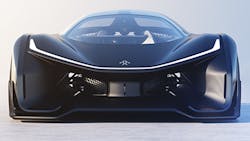CES: Mysterious Electric Car Startup Unveils Prototype
LAS VEGAS — The mystery electric car startup Faraday Future, which seeks to “redefine mobility,” unveiled its first prototype vehicle Monday night while offering few details on its ownership and structure.
The company took the wraps off its tech-inspired Batmobile-style vehicle that is part of a plan to compete against the likes of Tesla and reshape the auto sector.
“We are redefining the very nature of cars and mobility,” said the company’s senior vice president of research and engineering, Nick Sampson, unveiling the “FFZERO1” prototype car on the sidelines of the Consumer Electronics Show in Las Vegas.
A company statement described the car as “a high performance electric vehicle built upon ... a modular engineering system optimized for electric vehicles, on which all future FF production vehicles will be based.” The “variable platform architecture” will help minimize production costs while speeding development, according to the company.
The company said it is aiming for an entirely new concept for vehicles with an emphasis on technology and personalization, instead of adapting existing automotive systems. The cars will, for example, integrate the smartphone into the steering column to provide real-time data to drivers and potentially use augmented reality to show road conditions.
The concept car could also be “fully autonomous,” according to the company.
The FFZERO1 “is an amplified version of the design and engineering philosophies informing FF’s forthcoming production vehicles,” said Richard Kim, head of design. “This project liberated our designers and inspired new approaches for vehicle forms, proportions and packaging that we can apply to our upcoming production models.”
Sampson said Faraday intends to move “very fast” on its plans and has already announced a $1 billion factory to be built near Las Vegas.
In just 18 months since its founding, Faraday has 750 employees and intends to produce its first car within two years. Faraday will move fast because it will act “more like a technology company than an automotive company,” Sampson said.
At the event, Faraday confirmed a “strategic partnership” with China-based media and tech firm Letv, but did not provide details about its ownership or even indicate its CEO. The company told AFP that its investors include Chinese billionaire Jia Yueting, founder of Letv, which is sometimes described as the Netflix of China.
Faraday Future employees include former executives from Apple, BMW, Google, NASA, Tesla and other prominent firms. Faraday is exploring “new types of ownership” for the vehicles, Sampson said, without elaborating. Earlier, he told AFP the company was looking at shared ownership options and added that “ownership models will change over time.”
Based in California, Faraday Future announced its factory plans in early December, saying it would be a “first phase” for the new company, which has yet to get a vehicle on the road. The facility is “something more than an ordinary ‘assembly line,’” according to its announcement, and will include three million square feet “for passionate creators and diligent visionaries, where new concepts will be refined and implemented.”
It will create 4,500 jobs in the region — the same area where Tesla is building a major new battery manufacturing facility.
While Faraday Future has often been compared with Tesla, Sampson said he does not see the company created by tech entrepreneur Elon Musk as a rival.
“We compete with companies selling gasoline cars,” he said. “Tesla, in some respects, we should consider as our allies, not our competitors.”
By Rob Lever and Sophie Estienne
Copyright Agence France-Presse, 2016
About the Author
Agence France-Presse
Copyright Agence France-Presse, 2002-2025. AFP text, photos, graphics and logos shall not be reproduced, published, broadcast, rewritten for broadcast or publication or redistributed directly or indirectly in any medium. AFP shall not be held liable for any delays, inaccuracies, errors or omissions in any AFP content, or for any actions taken in consequence.
